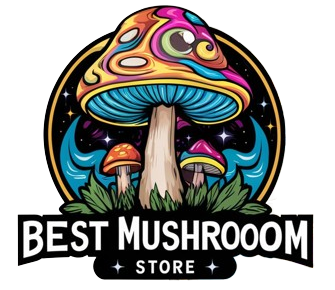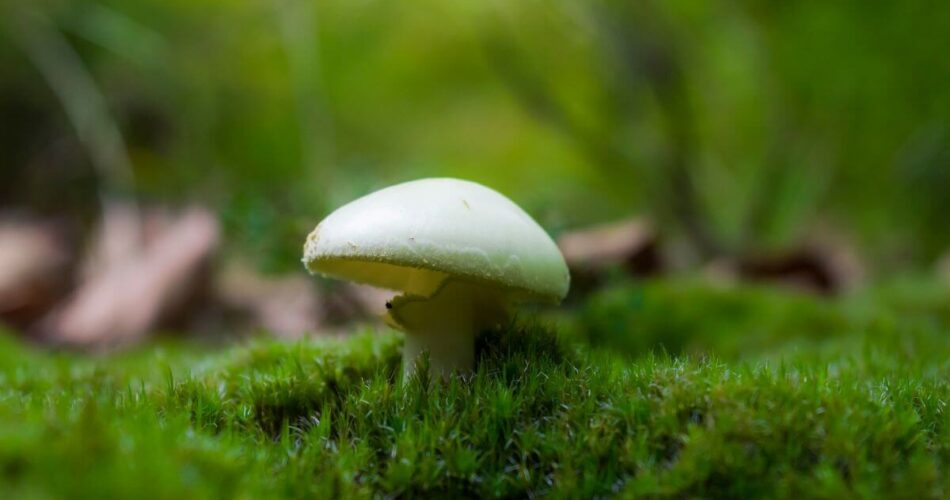The Amanita gemmata mushroom is one of the most beautiful and intriguing mushrooms in the world. With its striking red and gold colors, it is certain to catch your eye. Dive into the magical world of shrooms and see what’s in store for you!
This amazing fungus is found only in a few select locations, and is highly sought after by mushroom collectors. Amanita gemmata has a rich history dating back to ancient times, and it continues to fascinate modern-day scientists and mushroom enthusiasts alike.
Description of Amanita Gemmata
It is truly a stunning, very beautiful mushroom with a wide, smooth, flat-capped head in yellowish or whitish color. The cap is often adorned with various shades of brown, buff and orange spots, circles, or flecks. The cap is often covered with a thin layer of fibrils. It has a volva that is sack-like and filled with dark brown spores. The stem is short and cylindrical, usually white, but sometimes flushed with brown or yellow.
Amanita gemmata is a small to medium-sized, white mushroom with a smooth cap, white gills and a stipe that is usually slightly bulbous at the base. The cap can range from 2 to 12 cm across (1 to 4 inches), and the stipe from 4 to 12 cm tall (1.5 to 4 in).
Where Can You Find Amanita Gemmata?
Amanita gemmata can be found in coniferous forests, especially at higher altitudes. They are very common in Europe, South America and Asia, but they are becoming more common in North America due to climate change. They can be found growing from June through October on lawns and fields. The habitat of this species is mainly deciduous forests, but, as mentioned, it can be found under conifers as well. It prefers sandy soil that contains lots of organic matter.
Is It Poisonous, Lethal or Edible?
Amanita gemmata, or the Jewel of the Mushroom World, is an edible mushroom, but it is not lethal. It can be poisonous to some people and even cause death in others. The Amanita gemmata is also known as the “Jewel Caps” or “Gem Caps,” and it has been around for centuries.
The Amanita gemmata is a poisonous mushroom that is also edible. Strange, right? It contains amanitin which is a toxic compound that can be harmful if consumed by humans. Many people die every year from eating this mushroom because they do not know what they are doing when picking them out of the forest or field.
Fun Facts and Trivia
Amanita gemmata is a type of poisonous mushroom, which is the reason why it has remained not so popular among mushroom lovers. Despite being highly toxic, it has been found that if consumed in the right amounts, Amanita gemmata can be used as an antidepressant. Here are some more fun facts for these psychedelics:
- The beginning of autumn and summer is the time when it is seen growing on trees and lawns.
- Amanita gemmata looks very similar to other poisonous mushrooms; therefore, it is quite easy to overlook it as such.
- Another reason why people avoid collecting this mushroom is, because it has a very bland taste with a starchy texture, which makes it unappealing to some people.
- This species seems to be a good companion for oak trees and sometimes for beeches as well.
Similar Posts:
- Amanita Pantherina, Known as Panther Cap – Features, Origin, Toxicity, and More
- Psilocybe Baeocystis – Unusual Psilocybin Species. Identification, Potency & Characteristics
- Psilocybe Stuntzii (Blue Ringer). How to Identify This Psilocybin Mushroom
- Psilocybe Weilii: Good for Making Magic Mushrooms? Don’t Mistake It With Psilocybe Caerulescens
- Amanita Muscaria: All You Should Know About Fly Agaric Poisonous Mushroom
- Are Mushrooms Legal in Jamaica? Different Types of Shrooms
- Psilocybe Pelliculosa. Magic Mushroom: Potency, Effects & Info on Its Spore Print




